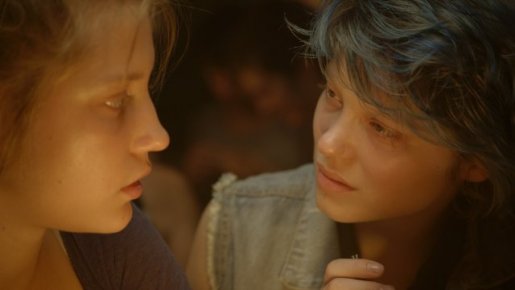Cannes 2013: The Winner - Blue is the Warmest Colour


In the Palme d'Or post awards press conference, jury president Steven Spielberg said, "...we were privileged to see this story of deep love and deep heartbreak evolve. we were absolutely spellbound by the brilliance of the performances of these two amazing young actresses. We felt that we needed to invite all three artists up on the stage at the same time." The jury exceptionally awarded the Palme to all three, director Abdellatif Kechiche and actresses Adèle Exarchopoulos and Léa Seydoux.
The film he was praising was Blue is the Warmest Colour, a very provocative and nubile lesbian love story in French. It lasts three hours and far from overstaying its welcome, it becomes more and more engaging, as this very classic, even ordinary, love story plays out its laughter, irony, passion and tears. Despite her foibles and errors, we become totally involved in Adele's perspective.
I'm not sure at what point in the three hours it no longer matters that it is a very sexual love story between two girls. Because the filmmaking is so perfect and accomplished, identification quickly replaces any casual prurience or sense of difference. Spielberg adds, "Had the casting been 3% wrong, it wouldn't have worked like it did. had anything been just a little left of centre, it wouldn't have had such a positive resolution." Irony oblige, as the prize was being awarded on the French Riviera, up in Paris the riot police were battling with the violent tail-end of a 'family values' demonstration against the recently passed law allowing gay marriage.
Abdellatif Kechiche is Tunisian by birth and came to France as a child in 1966. Two of his previous three films have also won top honours and all deal with issues of difference and (in)tolerance. He is also a staunch supporter of the Arab Spring, though it is unlikely, because of its sex scenes, that Blue is the Warmest Colour will be seen anywhere in North Africa or even some parts of the USA. A barometer film, it will reflect opinion and court both admiration and controversy in mixed measures for months to come as it is released territory by territory.
Cannes & The Role of Cinema
Cannes is special in allowing a platform for a film like this and to many other films purely because of their artistic qualities. It is also special in that it can bring two of the most influential Hollywood players, like Spielberg and producer Harvey Weinstein, to explicitly extol the virtues and necessity of ensuring cultural diversity and deeming culture trade as a commercial venture not like others.
The last remark that Spielberg made in his intro speech on the Lumiere Theatre stage, before revealing the competition winners was "The selection of the films all of us have seen in the festival is also a pledge for different ways of understanding cinema and as long as the cultural exception is the best way to support diversity in filmmaking (spontaneous applause). I think we need to consider this more seriously."
He was very directly referring to the current negotiations between the EU and the US regarding free trade and culture and, like Weinstein a week before, coming down firmly on the French and European side on an issue that matters to us all.
Stay tuned for Seamas's coverage of the runners up from Cannes 2013.








